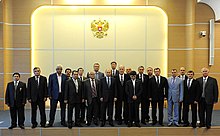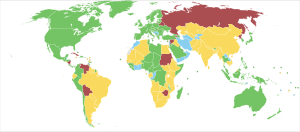Republic of Crimea (Russia)
To facilitate the annexation politically,[15] on 6 March the Crimean parliament and the Sevastopol City Council announced a referendum on the issue of joining Russia.
[17] On 11 March 2014, the Crimean parliament and the Sevastopol City Council jointly issued a letter of intent to unilaterally declare independence from Ukraine in the event of a "Yes" vote in the upcoming referendum, citing the "Kosovo precedent" in the lead part.
[42] The new constitution confirms the Republic of Crimea as a democratic state within the Russian Federation and declares both territories united and inseparable.
[43] According to the Kommersant newspaper, the authorities, including the State Council chair Vladimir Konstantinov, unofficially promised that certain quotas would be reserved for Crimean Tatars in various government bodies.
[citation needed] On 1 June 2014, Crimea officially switched over to the Russian ruble as its only form of legal tender.
Ukrainian Ministry and Crimean Human Rights Group say the real number could unofficially be many times higher.
[51][52][53] On 31 March 2014, the Russian Prime Minister Dmitry Medvedev announced a series of programmes aimed at swiftly incorporating the territory into Russia's economy and infrastructure.
[60] In 2022, Russia conquered portions of Kherson Oblast, which allowed it to unblock the North Crimean canal by force, resuming water supply into Crimea.
[66] This includes sentences (for "encroaching on Ukraine's territorial integrity and inviolability") for pre-2014 calls for an incorporation of Crimea into Russia.
[71] Crimea's only land boundary is with mainland Ukraine, which continues to claim sovereignty over the peninsula, with a number of road and rail connections.
But during two years the COVID-19 pandemic the region had one of the largest summary fall in life expectancy in Russia, and in 2021 it became 69.70 years (65.31 for males and 73.96 for females)[74][75][better source needed] According to the Constitution of the Republic of Crimea:[76][better source needed] Article 10 According to the 2014 census by occupation authorities, 84% of Crimean inhabitants named Russian as their native language; 7.9% named Crimean Tatar; 3.7% Tatar and 3.3% Ukrainian.
[77] According to the Republic of Crimea Ministry of Education, Science, and Youth,[78] most primary and secondary school pupils have decided to study in Russian in 2015.
[80] A report (realised in the summer of 2015) of the Organization for Security and Cooperation in Europe (OSCE) stated that the Republic of Crimea had the aim to "end the teaching of Ukrainian" by "pressure on school administrations, teachers, parents, and children".
[82] Since 2014, the United Nations has reported a regime of human-rights violations imposed by the Russian occupation authorities, including targeting religious minority groups and individuals.
[83][84] Peninsula economy is based on tourism, agriculture (wines, fruits, wheat, rice and further crops), fishing, pearls, mining and natural resources (mainly iron, titanium, aluminium, manganese, calcite, sandstone, quartz and silicates, amethyst, other), metallurgical and steel industry, shipbuilding and repair, oil gas and petrochemical, chemical industry, electronics and devices machinery, instruments making, glass, electronics and electric parts devices, materials and building.
[90] In the case of the Zalyv Shipbuilding yard, Crimean "self-defense" forces stormed the company's headquarters to demand nationalization.
[90] Head of the Republic Sergey Aksyonov claimed that in at least one case "Employees established control of the enterprise on their own, we just helped them a little".
[90] The nationalization of Ihor Kolomoyskyi's assets was, according to Aksyonov, "totally justified due to the fact that he is one of the initiators and financiers of the special anti-terrorist operation in the Eastern Ukraine where Russian citizens are being killed".
[91][92] By late October 2014 90% of the heads of Crimean government-owned corporation were fired as part of a supposed anti-corruption campaign, although no charges have been filed against anyone.
Human rights activists in the region have described the seizures as lacking a legal basis and dismissed the "anti-corruption" rationale.
[93] In June 2015 the Federal Security Service (FSB) started several anti-corruption criminal cases against high ranking Crimean officials.
[95] Eight months after the 21 March 2014 formal annexation of Crimea by Russia it became impossible for clients of Ukrainian banks to access their deposits and most of them did not pay interest (on loans).
[7] United Nations monitors (who had been in Crimea from 2 April to 6 May 2014) said they were concerned about treatment of journalists, sexual, religious and ethnic minorities and AIDS patients.
[124][125] In May 2018, Server Mustafayev, the founder and coordinator of the human rights movement Crimean Solidarity, was imprisoned by Russian authorities and charged with "membership of a terrorist organisation".
The United States, European Union, and Australia all claim to not issue visas to residents of Crimea with Russian passports.
[132] On 22 March 2014, President Hamid Karzai of Afghanistan told a U.S. delegation that he recognised and supported the Crimean referendum and "respects the free will of the people of Crimea and Sevastopol to decide their own future".
[133] On 23 March 2014, Alexander Lukashenko, the President of Belarus stated that Crimea was de facto part of Russia, but the country did not officially recognise the Russian claim until November 2021.
[136][137] Australia, Canada, Chile, France, Germany, Italy, Indonesia, Japan, Mexico, United Kingdom, United States and 89 other countries voted for; Armenia, Belarus, Bolivia, Cuba, North Korea, Nicaragua, Sudan, Syria, Venezuela and Zimbabwe, as well as Russia, voted against.
[citation needed] Reuters reported unnamed UN diplomats saying the Russian delegation threatened with punitive action against certain Eastern European and Central Asian countries if they supported the resolution.
[138] Subsequent United Nations General Assembly resolutions also reaffirmed non-recognition of the annexation and condemned "the temporary occupation of part of the territory of Ukraine—the Autonomous Republic of Crimea and the city of Sevastopol".







In favour Against Abstentions Absent
